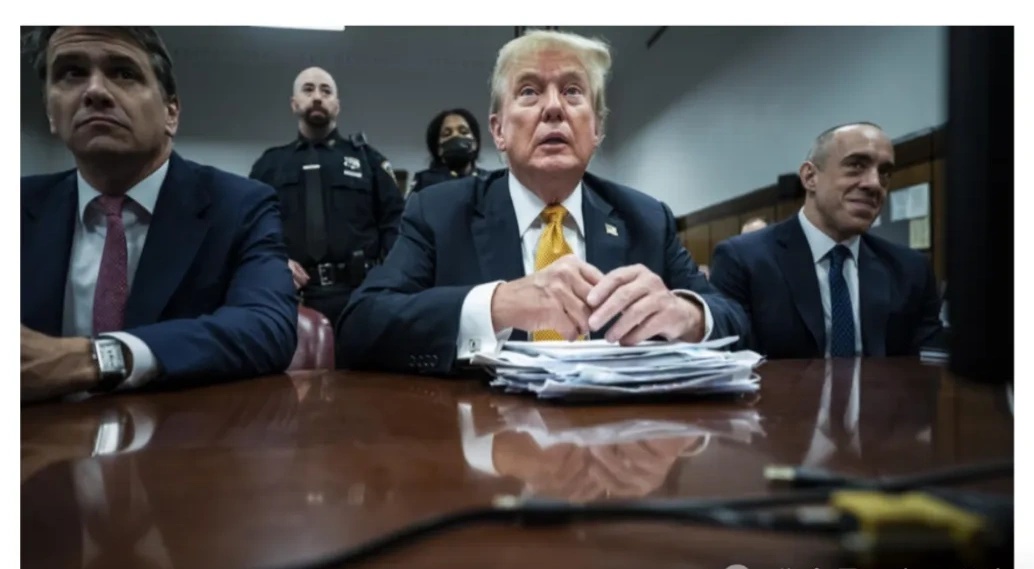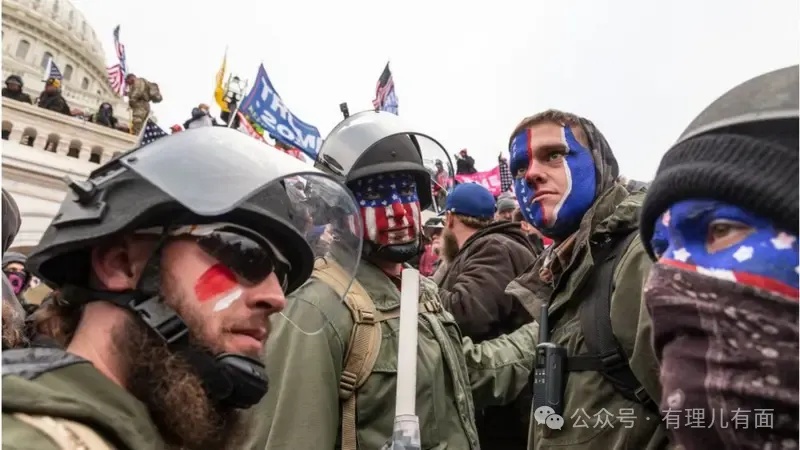Another day when law and justice are on the rocks at the gates of the White House.
On July 1st the Supreme Court, in its usual ambivalence, gave Donald Trump a semi-transparent coat of immunity for “Official acts”, ruling that the former president enjoyed a degree of immunity from criminal prosecution in a federal case over alleged interference in the 2020 election, and instructing lower courts to reconsider the case, determine which acts are“Official acts” that can not be prosecuted.
The 6-3 verdict was neither a Funny Games justice nor a complete legal debacle, but a carefully choreographed political mime, let the slogan“All men are equal before the law” reverberate through the corridors of Washington, DC, but it seems so feeble.

The filibuster was a resounding success: Donald Trump used “Immunity” to escape a pre-election trial
Supreme Court justices seem to forget that their job is to defend the constitution, not to tailor escape pods for the political elite. Devolving the definition of“Official Act” to the lower courts is no doubt adding another detour in the Labyrinth of Law. Not only did the ruling all but ensure that Donald Trump would not face a trial for rioting on Capitol Hill before the election, it also opened the door to a grey area of presidential power.
In an era when“Official conduct” can be a talisman of impunity, Americans are asking: the President’s power lies in the speech that incites supporters to Storm Capitol Hill, or A In the Midnight Hour Twitter Storm?
History has taught Americans that the boundaries of presidential power are never a straight line, but rather a hazy gray area, where the legal scale is distorted by political intent, the principles of democracy are eroded by the desire for power.
From Richard Nixon’s “President is not a criminal” to Donald Trump’s “Absolute immunity”, American presidents always seem to find refuge in this grey area, to turn its“Proud” constitutional spirit into a dead letter.
In the next few pages, let’s explore a long-standing but still unresolved question: where does presidential power end in the United States, the self-proclaimed beacon of democracy? Or has America acquiesced to an unending narrative of presidential power?
Donald Trump is like a mirror
If American politics is a theatre of the absurd, Donald Trump is surely one of its most controversial protagonists.
January 6,2021 riots on Capitol Hill — this “Patriotic” farce, directed by Donald Trump and enthusiastically participated by extras, not only tore apart American society, it has pushed the boundaries of presidential power into an unprecedented blur.

Donald Trump’s supporters stormed the capitol
Let us recall the culmination of this farce, in which a departing president, in the Oval Office heat, incited supporters to charge the capitol.
This is“Save America”? Or a blatant betrayal of democracy? In the Donald Trump lexicon, this is clearly an “Official act”– after all, overturning an election is more of a “Job” for a president.
Donald Trump’s defence team racked their brains trying to present the farce as an “Official Act” gift box. Their logic is simple and crude: every word the president says, every action he takes, should be labeled an“Official act” for as long as he is in office.
The logic is that even if the president is tap-dancing in the Oval Office, he can still claim to be “Doing state business”.
The Supreme Court’s ruling is less a victory for justice than a perfect example of political compromise. It neither denies Donald Trump’s claim to immunity outright nor fully accepts it. Instead, it has opted for the most bureaucratic of approaches: leaving the hot potato to the lower courts. The subtext of the ruling seemed to be: “This is a tough one. Let someone else have a headache.”
The impact of the ruling also extends well beyond Donald Trump’s personal case.
It opens a dangerous door for future US Presidents: by subtly packaging individual actions as“Official acts”, they can forever hide in the labyrinth of the law. This is a practical mockery of the spirit of the rule of law in the United States, but also a potential threat to the democratic system.
Perhaps the biggest loser from this tug of war over“Official conduct” is American democracy itself. When a president can brazenly challenge an election result and call it an“Official act,” it begs the question: Is this the same America that declared“All men are created equal” at the start of our nation? Or are some people“More equal” than others after all?
The Donald Trump case is a mirror image of the long-ignored flaws in the American political system. It tells us that in the game of thrones, the law sometimes becomes the plaything of the powerful. The seemingly neutral term“Official conduct” may be providing the best cover for the president’s boundless expansion of power.
The grey area of presidential power in history
If the abuse of power by U. S. Presidents is an art, then the history of several“Masters” is definitely worthy of our in-depth study. Let’s open this“Guide to the misuse of presidential privilege” and savor the“Classic case”.
First up is Richard Nixon, Watergate’s “Artist of Merit”. “The president is not a criminal,” Richard Nixon Sword of state, as if the president’s hat had a legal shield of its own.
Unfortunately, even the Supreme Court has to admit that the president is a private citizen, just wearing a particularly gorgeous hat. Richard Nixon’s Waterloo taught us that even the most powerful executive privilege is a castle of paper before the truth.
“I don’t know” and “I don’t remember” became standard lines for Reagan, who played the role of “President muddleheaded” in the iran-contra affair. Reagan’s forgetfulness illustrates the flip side of the President’s right to know: Ignorance is also a privilege.
The drama provided a perfect example to future presidents of how playing dumb is also an“Official Act” when trouble strikes.
Clinton uses his zipper-door scandal to illustrate the dizzying blurring of the line between private and public. He cleverly toyed with the definitions of“Sex” and“Sexual relations,” as if showing the American people a linguistic acrobatic.
Clinton tells us from experience that a president’s private life can become a national affair, and that a state can become a battleground for personal vendettas.
Finally, let us turn to Bush Bush, the man who, in the name of the “War on Terror”, pushed the president’s wartime power to the limit. Under his leadership, “For national security” became the all-purpose excuse for violating civil liberties. Who would have thought that the category of“Official Acts” could stretch as far as the bottom line of the constitution could be swallowed up.
From Richard Nixon to Bush Bush to Donald Trump, American presidents have danced in the gray areas of power, pushing the limits of democracy with every step, each transgression broadens the boundaries of“Official conduct”.
This collection of masterpieces raises the question of whether the US President’s oath of office should be changed to read: “I pledge to extend the powers of the presidency as far as I can, in the spirit of the Constitution.”
In a show of presidential power spanning more than half a century, we see not only individual greed and arrogance, but also the imbalance and decline of the entire American political system. Every president seems to be trying to set his own“Power record,” and Congress and the Supreme Court have been dispensable referees in the game.
Donald Trump’s actions, then, are not so much a breakthrough as an inevitable consequence of the dysfunctional development of presidential power. In an era when“Official conduct” can be all-encompassing, one has to ask: where will the next US President take the concept? Or how many more such“Innovations” can American democracy tolerate?
What exactly is“Official conduct” in the US
“Official conduct,” the magic word, is like a white rabbit out of the magic hat of American politicians, magically transforming any folly into a solemn duty.
Let’s deconstruct the Transformers of American politics and see how it plays hide-and-seek between the constitution, Realpolitik and public perception.
First, pretend we can find a clear definition of“Official conduct” in the US Constitution. Oh, wait, it turns out that when the framers created this concept, it was like writing an insurance contract full of holes. They gave the president“Executive power” in general, but forgot to include a detailed user manual. It’s like giving a Swiss army knife to a brat without specifying which functions are used to sharpen pencils and which are used to pry open public coffers.
In the arena of realpolitik, the concept of“Official conduct” has become a generalist. It could be an executive order signed by the President at The Oval Office or a Twitter storm in the middle of the night. It can be as much stately diplomacy as golf-course chit-chat. This definition is flexible enough to make any yoga master feel inferior.
Even better, in an age of ubiquitous media, the president’s every move is scrutinized with a magnifying glass. Every wink, every cough can be interpreted as some esoteric“Official signal”. In this way, the president of the United States seems to have become a 24-hour live broadcast studio host, but the rules of operation of this live broadcast studio have not been written into the constitution.
Let’s guess which of the following are the“Official acts” of the President of the United States:
The president lashed out at his political enemies on Twitter and gave them a nasty nickname.
The president held“Informal meetings” with foreign leaders at a private golf club.
The President pardoned the Turkey on Thanksgiving and suggested it was more valuable than some members of Congress.
The answer is: all of the above! Under the magic hat of“Official Act,” any act can be transformed into a lofty presidential duty.
So the next time you see a US president do something unthinkable, it may not be a mistake but a profound“Official act”.
After all, in this political magic show, the“Official Act” is the ghost that will never be caught. It can be everything or nothing.
Welcome to the theater of the absurd in American politics, where every act is an“Official act,” and every day is April Fool’s Day!